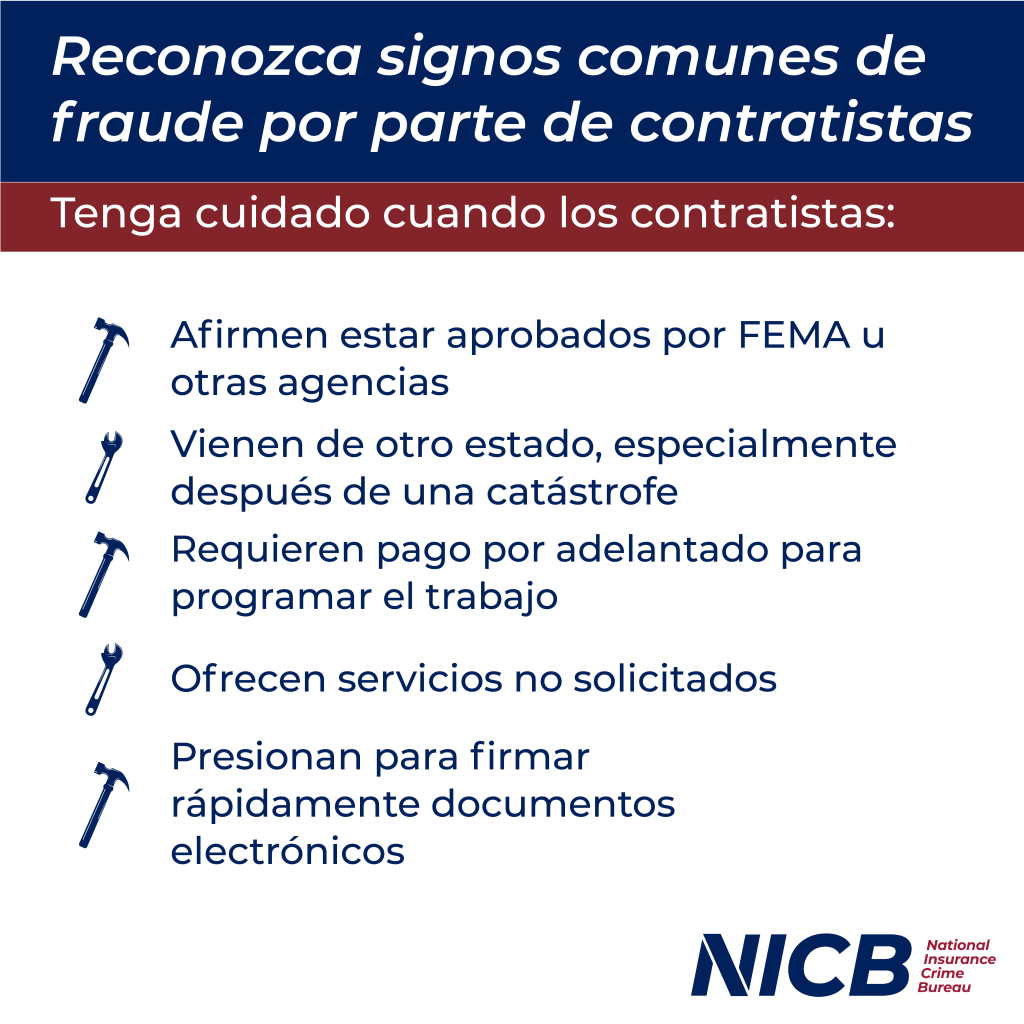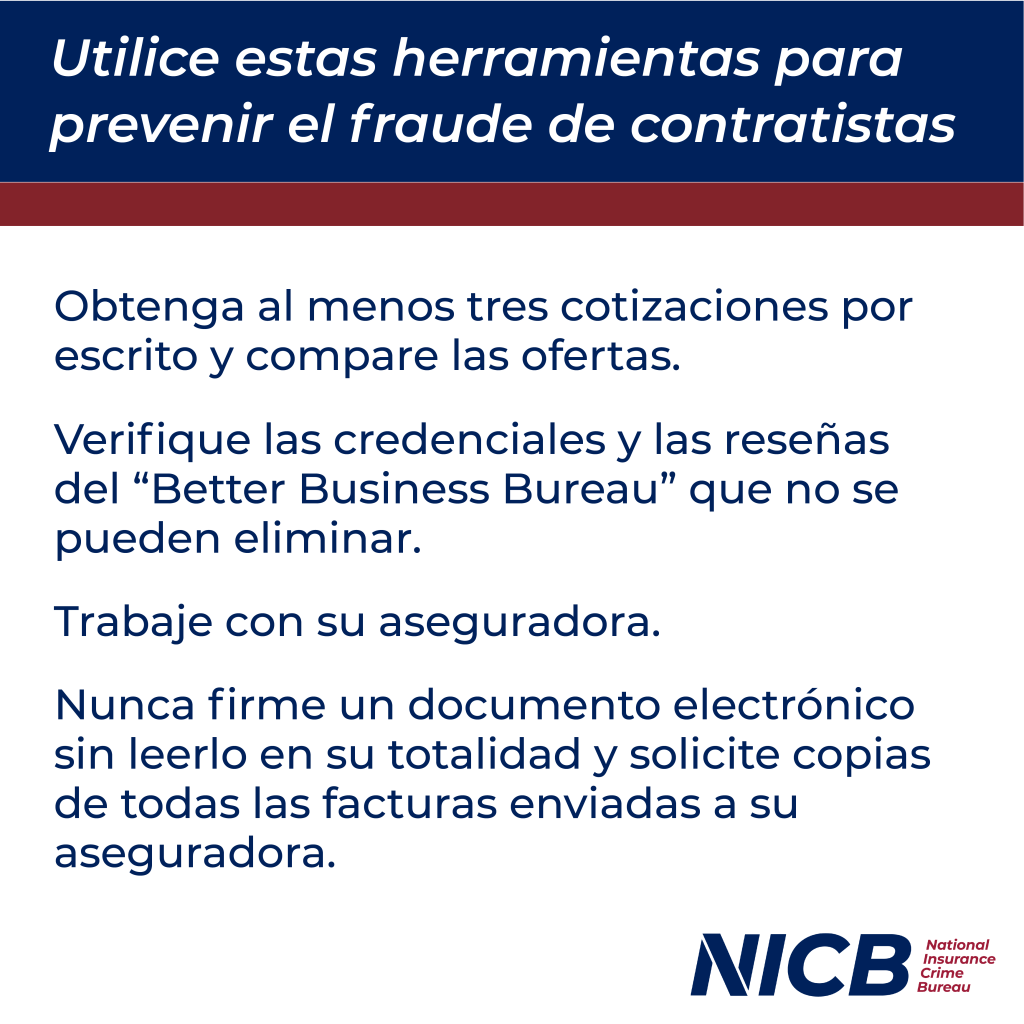Contractor Fraud
When Contractors Can’t Be Trusted
When your home is damaged by a storm, fire or even a water leak, your life is disrupted and may even be turned upside down. To get back on track, you rely on professional contractors to repair and reconstruct your house. Unfortunately, some contractors are not worthy of the trust you place in them.
Tips To Guard Against Contractor Fraud:
- Contact your insurance company for a list of reputable companies.
- Check BBB reviews of any company you plan to hire.
- Avoid pressure to quickly sign electric documents, specifically Assignment of Benefit (AOB) forms, that allows them to bill the insurance company directly.
- Get multiple bids for the work and read them carefully to ensure all costs are captured and no blanks are included in the forms.
- Do not pay for work upfront.
- Take pictures of the damage and document daily progress of the repair assuring the contractor stays on schedule.
- Maintain contact with your insurance claim adjuster to assure the work is covered by insurance before authorizing work.
Out-of-Control Water Mitigation Schemes
What may start as water damage from a leaking roof or pipe could escalate if you are caught up in this organized ring to defraud homeowners and insurance companies.
When homeowners identify water damage in their home, it’s natural to contact their home warranty company or a plumber directly to stop the leak and repair the damage. With this scam, the plumber recommends a mitigation company, allegedly with a hefty referral fee for the plumber, and the mitigation company moves in with moisture readings and extensive recommendations to demolish and rebuild. Homeowners are pressured to sign documents and lock in their services, frequently including an AOB form.
While it sounds like a great solution having the mitigation company work directly with the insurance company, when the mitigation and restoration process is inflated beyond the homeowner’s insurance coverage and the homeowner has signed contracts upfront, they may be on the hook for tens of thousands of dollars in repairs. If they don’t pay up, lawyers step in and place liens on the home.
Tips specific to this scam: Do not blindly accept a plumber’s recommendation. Be wary of third-party billing processes of water mitigation companies.
Complex Roofing Scams
Following a storm, homeowners want to make sure their home is not damaged. So, when roofing companies come to the door offering a free roof inspection, it sounds like the perfect solution to calm their fears.
The roofers may already be working on other roofs in the neighborhood and will ask the homeowner to electronically sign documents to begin the inspection process. They are presenting forms to authorize the repair and the AOB form to allow them to submit claims directly to the insurance company.
In some cases, the roofer creates damage that the insurance company can prove was not caused by a storm. In those cases, the homeowner may be responsible for the cost of the repair since they authorized the work when they signed the form.
Tips specific to this scam: Be wary of door-to-door roof inspection offers, especially following a storm.
Out-of-State Contractors Flooding Communities After Disasters
Following a natural disaster, especially one that impacts a large area, local contractors can be overwhelmed by the needs of their communities. Unfortunately, that opens the door for outside contractors to move into the area. While most of those contractors are there to help, homeowners need to be aware that some are not.
Like with the roofing fraud, these fraudulent contractors appear at doorsteps post-disaster and are usually from out-of-state. They prey on unsuspecting homeowners who really need help and are vulnerable to the promises of quick repairs.
They may indicate they are FEMA-endorsed or provide other types of proposed credibility, but FEMA does not endorse individual contractors. They know their potential victims are urgently looking for help and prime candidates for their promises. They provide a work proposal that they never expect to fulfill.
Tip specific to this scam: Be wary of out-of-state contractors that approach you with offers of help – work with contractors that are licensed in your state.
Report Contractor Fraud Immediately
Victims of contractor fraud may be embarrassed and ashamed that they fell for a scheme. As a result, they could be hesitant to report this criminal activity.
Remember, these are professional criminals who are good at what they do and use the vulnerable situation of their victims to their advantage. If you do not report a fraudulent contractor, they are likely to move on to their next victim.
We also know that education and awareness are the most powerful tools we have for prevention. By making sure consumers know what to look for, we can make sure their manipulation tactics are not successful.
If you need to hire a contractor, use our contractor fraud checklist to as a guide to help you find the right company to repair your home or business.
Find out how to report fraud on our Report Insurance Fraud page.
Contractor Search Checklist
It can be hard to find a reputable contractor you can trust — especially when you're dealing with the effects of a loss.
Using a contractor search checklist can help you organize your thoughts and needs, and can help you make a decision quicker and easier. It helps you gather information from each contractor you talk to, so you can see the differences between them.
It is a valuable tool for keeping yourself safe and avoiding fraud.
Common Signs of Contractor Fraud


Prevention Tips

